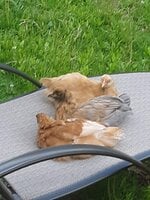Kaesi2020
Songster
Hi all, I am interested in hearing about the routines other people have with their chickens, like times and events for caring for them on a daily basis.
For example:
A typical day for me involves waking my 6 chickens up around 7:30. This involves opening the bottom coop door to let the hens out into the run. When I do this I pet them a bit and check them over quickly for any issues. I also use this time to freshen their water and food and put them down in the run with them.
During the week, I have work on and off throughout the day (I am a second grade teacher teaching remotely due to the virus so I have availability of and off until around 3) so depending on my schedule, I basically let them out to free range whenever I can supervise (may be 9 to 10, may be 12 to 2, etc). During their free range time, I do coop and run cleaning. I am using the deep litter method in the run so I may sprinkle some grass clippings or pine shavings over the larger poops. I basically just spend a few minutes freshening up the run for them. I am using the deep bedding method in the coop so I scoop out the poops in there and add a fresh layer of bedding in certain areas. This cleaning takes about 15 minutes. I like to do it each day since I have the time currently to do so. After that, I spend some time with the chickens in the yard and then they usually go back in the run for a few hours so I can do more chores and school work inside the house.
I let them free range again from about 5 to 7. They tend to sit with me at this time on my chair which is very cute (my two buff orpingtons sit in my lap like lap dogs and the others perch on the chair arms). Between 7 and 730 they know to go in the run, relax, and slowly move up to their coop. During that time, I am in the house, making dinner, etc.
I'll come back out at around 8 to make sure they are all in the coop, they have their waterer refreshed and back in the coop with them, and I lock everything down for the night. I am still leaving food for them in the coop at night but I'm thinking of stopping this to prevent pests.
What does a typical day look like for you???
For example:
A typical day for me involves waking my 6 chickens up around 7:30. This involves opening the bottom coop door to let the hens out into the run. When I do this I pet them a bit and check them over quickly for any issues. I also use this time to freshen their water and food and put them down in the run with them.
During the week, I have work on and off throughout the day (I am a second grade teacher teaching remotely due to the virus so I have availability of and off until around 3) so depending on my schedule, I basically let them out to free range whenever I can supervise (may be 9 to 10, may be 12 to 2, etc). During their free range time, I do coop and run cleaning. I am using the deep litter method in the run so I may sprinkle some grass clippings or pine shavings over the larger poops. I basically just spend a few minutes freshening up the run for them. I am using the deep bedding method in the coop so I scoop out the poops in there and add a fresh layer of bedding in certain areas. This cleaning takes about 15 minutes. I like to do it each day since I have the time currently to do so. After that, I spend some time with the chickens in the yard and then they usually go back in the run for a few hours so I can do more chores and school work inside the house.
I let them free range again from about 5 to 7. They tend to sit with me at this time on my chair which is very cute (my two buff orpingtons sit in my lap like lap dogs and the others perch on the chair arms). Between 7 and 730 they know to go in the run, relax, and slowly move up to their coop. During that time, I am in the house, making dinner, etc.
I'll come back out at around 8 to make sure they are all in the coop, they have their waterer refreshed and back in the coop with them, and I lock everything down for the night. I am still leaving food for them in the coop at night but I'm thinking of stopping this to prevent pests.
What does a typical day look like for you???
Attachments
Last edited:





 Hens will free-range during the day, with access to the barn, barnyard, and barn pasture.
Hens will free-range during the day, with access to the barn, barnyard, and barn pasture.